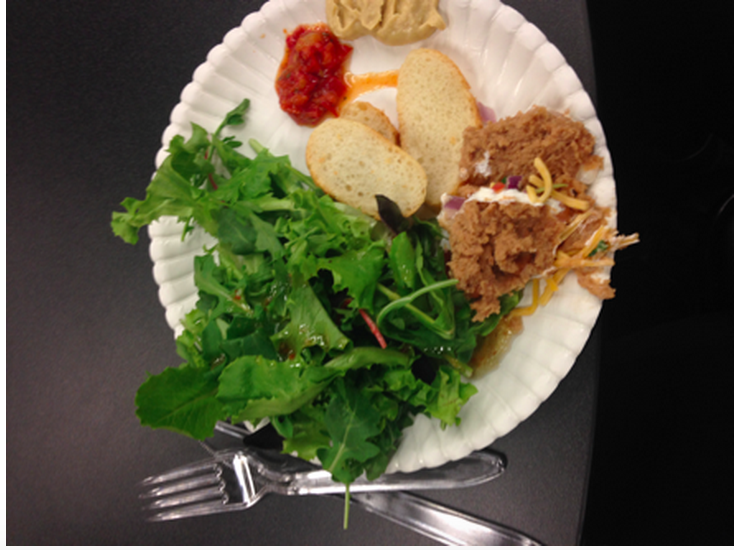“The Hunger Banquet:” Raising Awareness About Housing and Food Insecurity on Campus and Beyond

Photo by Lia Cohen
On Tuesday, April 25, UCLA’s Hunger Project hosted “The Hunger Banquet,” one of a series of events taking place on campus as part of Homelessness Awareness Week. In partnership with Swipe Out Hunger, CSC, Bruin Shelter and various other student organizations, members of The Hunger Project assembled in the Strauss Clubhouse to educate students about the severity of housing and food insecurity for students and residents of the greater Los Angeles area.
The event was not your average powerpoint presentation or formal panel. Organizers engaged audience members in an interactive dinner that simulated some of the stark realities of food insecurity. Upon entering the event, attendees spun a virtual wheel and were given colored stamps. Each color represented a different social class, with black, green, red, and blue indicating lower class, lower middle class, upper middle class, and wealthy respectively. Participants were then given varying amounts of food based on their social class.
At some tables lucky members of the ‘elite’ sat with plates overflowing with sandwiches, salads, dips, breads and even dessert. By their side were less fortunate participants, nibbling on plain pieces of bread.
Several members of the ‘lower class’ were pleasantly surprised at the generosity of the more fortunate students around them, who offered to share some of their food. Other students received offers, but felt uncomfortable accepting food from members of the ‘higher classes.’ While living in a big and economically segregated city like Los Angeles makes it is easy to turn a blind eye to the issues people are facing, participants found that sitting down and sharing a meal with those who have less helped to foster acceptance and generosity.
The event was spearheaded by third-year student and Internal Executive Director of The Hunger Project, Helen Li, who delivered an insightful presentation on the state of both housing and food insecurity in Los Angeles. According to Li, at least 40,000 people in Los Angeles have no home to sleep in on any given night. Li argued that while homelessness is often perceived as an economic versus housing issue, it doesn’t end there. Many members of the homeless population are dealing with a multitude of stressors, from food insecurity to mental health issues to domestic abuse and discrimination due to race, gender and sexual identity. Li noted that a disproportionate amount of LA’s homeless population is comprised of male people of color, and of homeless youth, 40 percent identify as LGBTQ.
While it is easy to observe homelessness on the streets of Los Angeles, student homelessness is far less visible. Though it seems as if there is always a new housing development on campus, the rise of housing, education costs, and other stressors has left a growing number of college students housing and food insecure.
One of the night’s goals was to educate students on how they can make a difference. Keynote speaker Luke Shaw, co-founder and outgoing co-president of Bruin Shelter, the first student run homeless shelter in the country, offered his advice. The organization operates a shelter, housed in a church in Santa Monica, that serves UCLA and Santa Monica College students facing homelessness. Upon opening the shelter, the club was able to house six students and to successfully transition them to other residences. The shelter is open from 7 p.m. to 7 a.m., and Bruin Shelter volunteers provide daily family style dinners, a study and sleeping space for the night, a to-go breakfast in the morning, and tap cards funded by donations from the UCLA Department of Transportation. The shelter is currently undergoing renovations to meet city code, but Bruin Shelter is looking forward to reopening and hopes to eventually increase capacity by at least a few beds. The club’s ultimate goal is to continue growing and open a space of its own. Beyond the LA location, Bruin Shelter would also like to have an open-source model which other college campuses can replicate.
The last speaker of the night exemplified the impact student leaders can have on both food and housing insecurity. As a general member of The Hunger Project, Disha Samaiyar recently launched a program that delivers left-over food from a restaurant in the Ackerman Student Union to Skid Row, providing hot meals to homeless people in need. The initiative plans to expand to the on-campus dining halls in order to reduce food waste and increase delivery to downtown Los Angeles.
Though the illustrious dining facilities and countless high rises at UCLA paint a picture of luxury living, the truth is that many students, at UCLA and beyond, face various levels of housing and food insecurity. Events like these help lift the veil, revealing the real stories of students who may have nothing better than the library floor to sleep on at night.
If you would like to get involved, Luke Shaw and his Bruin Shelter team are looking for volunteers and supervisors (find out more here.)




